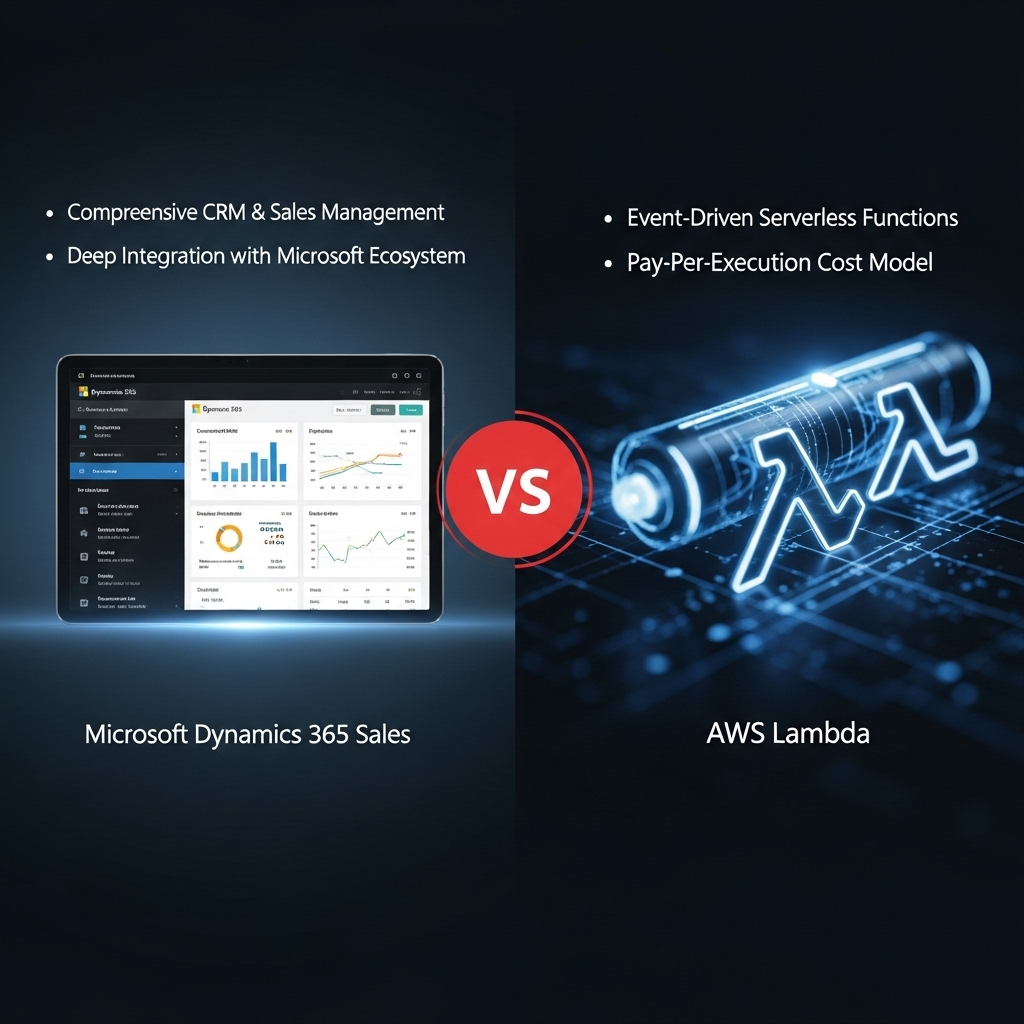Cloud services > Microsoft Dynamics 365 Sales vs. AWS Lambda
Selecting the right platform hinges on specific business needs. Microsoft Dynamics 365 Sales provides a complete CRM solution, while AWS Lambda offers serverless computing capabilities. The choice depends on whether you need sales management tools or a flexible computing environment.
This comparison analyzes real-world performance, user feedback, and key differentiators to help you make an informed decision.
Quick Verdict
For businesses needing a full-fledged CRM solution deeply integrated with Microsoft products, Dynamics 365 Sales is the better choice. If serverless computing and AWS ecosystem integration are paramount, AWS Lambda is more suitable, but be prepared for self-service support.
- Dynamics 365 Sales offers comprehensive CRM features with Microsoft ecosystem integration, while AWS Lambda provides serverless computing with AWS service integration.
- Dynamics 365 Sales has structured pricing, while AWS Lambda offers granular pay-per-use billing.
- AWS Lambda lacks direct customer support availability, a potential drawback for users needing assistance.
Who Should Choose Which?
Choose Microsoft Dynamics 365 Sales if:
Businesses requiring a comprehensive CRM system with strong Microsoft ecosystem integration, sales automation, and customer relationship management features.
Choose AWS Lambda if:
Developers and organizations needing serverless computing capabilities, event-driven processing, and seamless integration with other AWS services.

Key features – Side-by-Side
| Attribute | Microsoft Dynamics 365 Sales | AWS Lambda |
|---|---|---|
| Scalability | Scalable, allowing resource adjustment as needed. Cloud-based infrastructure grows with business needs. | Automatically adjusts concurrent instances to handle traffic. Scales horizontally, creating new instances rapidly. |
| Integration Capabilities | Integrates with Microsoft 365, Azure, Power Platform, Teams, OneDrive, SharePoint, and third-party ERP/CRM systems. | Integrates with Amazon S3, DynamoDB, Kinesis, API Gateway, SNS, SQS, Amazon Cognito, Lex, Alexa, Step Functions, CloudFormation, CloudWatch Logs, CodeCommit, Config, and IoT Events. |
| Customization Options | Tailor the CRM platform to align with business workflows. Configure entities, fields, forms, dashboards, reports, and views. | Customize Lambda functions with business logic. Supports Node.js, Python, Ruby, Java, Go, C#, PowerShell, and custom runtimes. |
| Pricing Model | Per-user per-month and per-app per-month pricing. Sales Professional starts at $20/user/month, Sales Enterprise at $65/user/month. App pricing varies from $15 to $180/app/month. | Pay-per-use pricing based on runtime and number of requests. Free tier includes one million requests and 400,000 GB-seconds of compute time per month. |
| Security Features | Role-based access control, data encryption, audit logging, Microsoft's secure cloud infrastructure, and integration with Microsoft 365 security tools. | IAM roles, encryption of environment variables, encryption in transit, logging and monitoring with CloudWatch and CloudTrail. MFA and SSL/TLS are recommended. |
| Compliance Certifications | GDPR compliance, aligns with UK regulations, certified to ISO 27701 (PIMS) and ISO/IEC 27001. | Complies with SOC, PCI, FedRAMP, and HIPAA. AWS provides compliance certifications and frameworks. |
| Customer Support Availability | Online chat, contact request, or phone call. Available Monday-Friday, 6 AM to 3 PM PT. | Not available |
| Uptime SLA | Microsoft generally offers SLAs for its cloud services, but specific details weren't found. | Offers a Service Level Agreement (SLA) with a Monthly Uptime Percentage of at least 99.95%. |
Overall Comparison
Pros and Cons
Microsoft Dynamics 365 Sales
- Scalable solution
- Pre-built integrations with Microsoft 365 products
- Allows integration with third-party systems
- Customizable CRM platform
- Offers role-based access control
- Data encryption
- Audit logging
- GDPR compliance
- Mobile app available
- No major disadvantages reported.
AWS Lambda
- Scales automatically to handle increasing workloads
- Pre-built integrations with many AWS services
- Highly customizable to meet specific business requirements
- Integrates with Amazon S3, enabling automatic data backup and recovery
- Can be installed in more than one region for disaster recovery
- Factors affecting AWS Lambda cost include function duration, memory allocation, request volume, and data transfer.
- Customer support availability not found in the search results
- User interface intuitiveness and learning curve information not found in the search results
User Experiences and Feedback
Microsoft Dynamics 365 Sales
- No highlights reported.
- No major complaints reported.
- No value feedback reported.
AWS Lambda
- No highlights reported.
- No major complaints reported.
- No value feedback reported.
Frequently Asked Questions
Which platform is easier to integrate with existing systems?
Dynamics 365 Sales excels in Microsoft environments, while AWS Lambda integrates well with AWS services. Consider your current infrastructure.
Which platform is more cost-effective?
AWS Lambda's pay-per-use model can be more cost-effective for sporadic workloads, while Dynamics 365 Sales' subscription model may be better for consistent usage.
Sources & Citations
- Official product specifications
- Expert reviews from tech publications
- User feedback from online forums
Information gathered through AI-assisted web search and analysis. Last updated: September 2025
Methodology & Transparency
Our comparison methodology combines multiple data sources to provide comprehensive, unbiased analysis:
- Data Collection: We gather information from official specifications, user reviews, and independent testing
- AI-Assisted Analysis: Advanced AI helps process large amounts of data while maintaining accuracy
- Human Oversight: All comparisons are reviewed for accuracy and relevance
- Regular Updates: Content is refreshed to reflect new information and user feedback
- Bias Mitigation: We strive for objectivity by considering multiple perspectives and sources
Versusly.ai uses AI-assisted content generation combined with human oversight to deliver comprehensive comparisons. We are transparent about our process and continuously work to improve accuracy and usefulness.